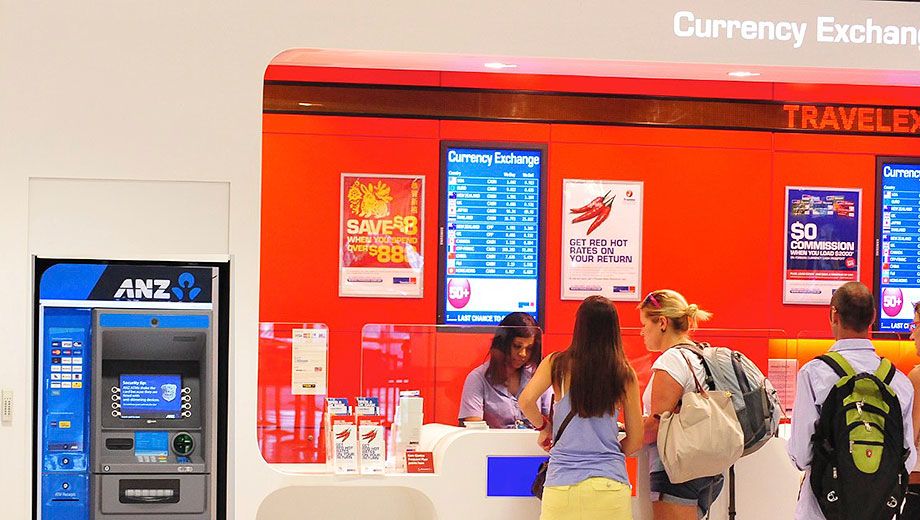Disclaimer
Executive Traveller may receive a commission when you apply for these credit cards via our links.
The information provided on this page is purely factual and general in nature. You should seek independent advice and consider your own personal circumstances before applying for any financial product.
If you're heading overseas and you're keen to avoid using your own credit and debit cards (due to high fees from Australian banks, and the risk of fraud), you might be wondering whether cash exchange or prepaid travel money cards is the best option.
Value for money
Generally speaking, prepaid travel money debit cards are cheaper than cash exchange -- especially if you need more cash mid-way through your trip.
Both cash and travel money cards involve a flat-fee paid at the outset. In the case of cash, it's to a bureau d'exchange, and in the case of a travel money card it's to a bank, or Travelex/American Express agent.
However, with cash, you'll also lose a percentage of your money in the exchange, because you'll usually get poor exchange rates. (The exception is if you book your cash exchange online with a company like Travelex, in which case you'll get much better exchange rates.)
Prepaid travel money cards almost always give you a pretty good exchange rate -- comparable to an online-booked cash exchange.
You can also avoid paying the upfront fee to buy the card with some card brands. For example, if you buy a Travelex Cash Passport or American Express Global Travel Money card at Australia Post, you can get them with no purchase fee.
Where travel money cards come into their own is if you spend more than you originally planned during your trip (and really, when does this not happen on a trip?)
Transferring more money onto the card generally incurs a 1.1% charge, which means in a $1,000 topup, you'll pay $11. This is almost certainly cheaper than the amount of money you'd lose by using a random foreign currency exchange booth, where exchange rates are often appalling.
Security
Obviously, the big downside with cash is the risk of losing it, with very limited coverage for loss/theft of cash under most travel insurance policies, and a slow claims process.
Travel money cards, on the other hand, have the advantage of being able to be easily replaced if you lose them, whereas replacing cash will require a travel insurance claim (if the policy even covers it) which can take many weeks to process.
Travel money cards are generally issued in pairs so you can keep one in your wallet, and one in a hotel room safe. If the first one is stolen, it can be deactivated without deactivating the second card, which has a different card number and PIN number.
They also have the advantage of only having a limited amount of money on them. If your card is skimmed and used fraudulently elsewhere, the amount of money you will lose is limited to the amount you've loaded onto the card.
Up-front costs
In our investigation of the cheapest currency exchange outlets in Australia earlier this year, we found that when buying £1000, the cost in Aussie dollars could be as little as $1696.65 (at Flight Centre Money Centre) or as much as $1916.00 (using the Travelex change booth at Sydney International Airport). That's a difference of almost $220!
The trick with exchanging cash is to pre-arrange it online with a foreign exchange company. If you walk up to a retail bureau de change at the airport, you will more than likely be ripped off badly -- you can lose 10-15% of your money through bad exchange rates.
Travel money cards are more predictable, but beware that with Travelex Cash Passport cards, if the card is not directly issued by Travelex, the exchange rate can be set by the company that sells it to you (Thomas Cook, etc.)
You can also avoid the up-front fee of purchasing the travel money card by purchasing at Australia Post, where Travelex Cash Passport and American Express Global Travel Money cards are sold with no purchase fee.
Fees for usage
Cash has the obvious advantage of being accepted everywhere and without any additional fees at the time of purchase (you may even be able to negotiate a discount for cash!)
However, the downside of cash is that once you have it one currency, if you don't spend it all in the country you're travelling to, you will lose money when you change it to another currency during your trip.
Some travel money debit cards don't have this problem. For example, Commonwealth Bank's Travel Money Card allows you to store balances in multiple currencies on one card, and transfer money between them at no charge.
However, with all the travel money cards, if you buy something in a currency other than the one you loaded on the card, you'll pay a conversion surcharge. It is usually better than what you'd pay at a foreign currency exchange bureau, though.
For example, Commonwealth Bank only charges 2% for a "wrong currency purchase". Travelex Cash Passport is an exception to this rule, though, slugging wrong currency purchases a whopping 8.45% penalty fee.
Travel money cards do not charge any fees for purchases made on the card -- as long as you spend in the right currency.
Preloaded travel money cards also do not charge a percentage surcharge if you withdraw the currency you've loaded onto the card, but they do charge a flat ATM withdrawal fee -- in the range of US$2.00 - US$3.75 for a US dollar withdrawal, for example. So they are a bit cheaper for withdrawing cash than standard Australian credit/ATM cards.
One inescapable gotcha that applies to any form of plastic card is foreign ATM operator fees, which can be $20 for one transaction if you're unlucky. Try to use ATMs that disclose the fee before the transaction goes ahead (though, naturally, the ones with the high fees don't usually do this.)
Which travel money card is best?
We've recently reviewed and explained Prepaid travel money cards in-depth here, comparing the four main cards on the market from Commonwealth Bank, ANZ, American Express and Travelex.
Which cash exchange bureau is best?
Check out our in-depth investigation of the cheapest currency exchange outlets in Australia.
Disclaimer
Executive Traveller may receive a commission when you apply for these credit cards via our links.
The information provided on this page is purely factual and general in nature. You should seek independent advice and consider your own personal circumstances before applying for any financial product.


Qantas - Qantas Frequent Flyer
14 Aug 2013
Total posts 1
What is your assessment of the 28 Degree card by GE Money?
Hi Guest, join in the discussion on Cash or travel money card: which is best for travellers?